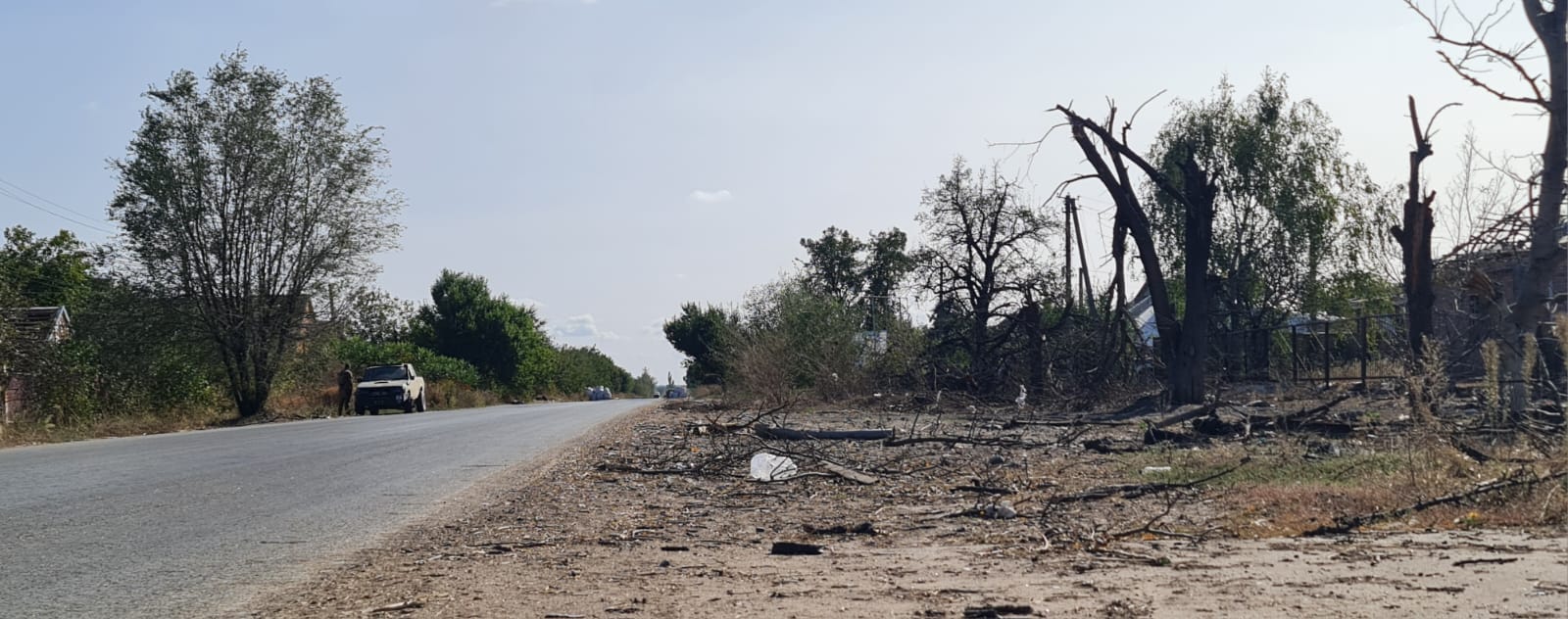
Zaporizhzhia, Ukraine – We meet Yulia in the early morning. The autumn weather, still sunny, has turned sharp, and we all wish we’d brought warmer jackets. She is the coordinator for Ukraine’s emergency and rescue services, in charge of distributing aid to villages just behind the frontlines, where normal life has long since vanished.
Organised yet sanguine, we are clearly not the first media team she has shepherded.
The drive towards the front takes a good hour, the signs of war more evident by the kilometre. Civilian and military vehicles speed up the closer we get. No one wants to become a target.

We arrive at an aid distribution centre, a fire station with a tarp roof, an old fire engine and a newer ambulance as its centre pieces. A small crowd of expectant villagers has gathered.
Before the war, Orikhiv was a town of 14,000 people. Now, just hundreds live here.
Old men and women gather in a small chatty knot. I briefly blush with shame as I stand next to them in full body armour while they natter in old clothes and slippers. One woman gives us a glance with a gentle smile on her face, feet encased in floral crocs; her only protection is a pair of earbuds she has in the whole time. I wonder why, and as if on cue, the sharp bang from a nearby artillery battery reminds me.
The barrage isn’t intense but a regular reminder of the proximity of the conflict, the whizz of an occasional Russian shell in reply. No one bats an eyelid.
Receiving bread and bottles of water, the small crowd disperses, leaving as good-natured as they came but with armfuls of loaves, most on slow bikes back home.
There isn’t an intact house in the entire town. Street after street, building after building lie shattered, roofs smashed in, doors and windows boarded up or left open to the coming cold.
In the distance, the singular sound of a hammer on wood as the residents, old yet resilient, repair what they can, putting up with what they can’t.

We follow a fire tender on its way to deliver water to a home nearby.
Empty barrels wait to be filled by the open door. An angry woman storms out and shouts at both us and the firemen, complaining that she is fed up with the food they bring, that it’s never enough, and that the presence of journalists will bring attacks upon her family.
The firemen start filling the barrels, doing their best to ignore her, but these are local volunteers caring for local people, and the discomfort is evident.
Her fury doesn’t mask the despair in her voice as she tells us her house was destroyed at the beginning of the war, and she, her disabled husband, and several others, have lived in the basement ever since.
We pause for a bit before the next location. Yulia quickly munches on an apple, her helmet off for once, then we head across the road from the aid centre. An old man – all the young people have left – is up a ladder banging at an exposed roofing joist, working methodically as the weather is due to turn bad soon.
Unsweetened grapes hang unpicked from his trellis vine as he takes us into his back garden where a crater, nine metres wide and three deep, occupies the centre. He is interviewed by the crater’s lip, telling us it was caused by a KAB 500, a precision-guided munition with a 500kg (1100-pound) warhead. Living in his smashed home has taken its toll.
“You are living, but it’s hard on the soul … we had a life here,” he says.

Next to the house, white-marked trails from the tracks of tanks run along the tarmacked road.
An APC loudly rumbles towards the front. A military pickup truck with a flat tire slowly trundles squeakily past in the opposite direction; exhausted soldiers in the back, matted with dust, stare at us blankly.
Walking through the deserted streets looking for a good spot to shoot our “piece to camera”, we come across an intersection, an abandoned church with a smashed spire on the corner. Police immediately pull up in a van, ask us who we are, impressing on us that a crossroads isn’t perhaps the safest place to film. They tell us to listen out for Russian spotter drones. A Ukrainian colleague jokes, “Better be quick”.
The whoosh of Grad rockets being launched from a battery close by makes us wary of incoming return fire, and we decide to pack up. On a gate on the other side of the road, a gang of sparrows, oblivious to the destruction, tweet and jostle each other for position.
We head off in the van, past the skeleton of a town, burned fields on either side of us.
A quiet day.







